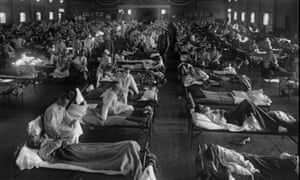A century on, why are we forgetting the deaths of 100 million?
The 1918 Spanish flu outbreak killed more people than both world wars. Don’t imagine such a thing could never happen again
This year marks a century since some women got the vote; a century since the end of the first world war; 50 years since the 1968 revolts; 70 since the founding of Israel and the NHS. All have been well marked. So it is striking that the centenary of one of the most devastating events in human history has been allowed to pass thus far with almost no public reflection of any kind.
This year is the 100th anniversary of the Spanish flu pandemic of 1918. Estimates about its impact vary. But when you read that a third of the entire global population probably caught the Spanish flu and that it killed between 50 and 100 million people in all corners of the globe – up to 5% of all human beings on the planet at the time – you get an inkling of its scale.
By the time the pandemic finally ended, it had killed around 25 times more people than any other flu outbreak in history. It killed possibly more people than the first and second world wars put together. As Laura Spinney puts it in her new book, Pale Rider – the best modern account of the Spanish flu crisis – “the flu resculpted human populations more radically than anything since the Black Death”. Think about that. Not the western front, not Hitler’s invasion of Russia, not Hiroshima. But the flu.
In the face of such figures, it seems unbelievable that we forget or look away. Yet we do. Perhaps that is because, unlike equality for women, a disease has no ultimate prize to win and celebrate. Perhaps it is because, while wars have victors, pandemics leave only the vanquished, as Spinney puts it. Perhaps too, as the critic Walter Benjamin once argued, silences about public horrors can permit human societies to cope with collective recovery and to progress. Or perhaps, as Spinney also reflects, the Spanish flu has been consigned to the footnotes because its onslaught did not occur in public but in private, behind closed doors in millions of homes.
Yet the Spanish flu epidemic was a public event too. It changed the course of the first world war (the Germans thought it robbed them of victory). It brought Switzerland – yes, Switzerland – to the brink of civil war over the inadequacy of the official response. The way it was mishandled in colonial India gave a major boost to the independence movement. It led to Madrid football club changing their name to Real Madrid, at the behest of the King of Spain as part of a public health drive. In Britain, in a sense, it triggered a concern about public health that would lead, 30 years later, to the NHS.
The flu struck the rich and the poor, the young and the old, women and men, black and white. Among those who caught it but recovered were the British prime minister David Lloyd George, the US president Woodrow Wilson, the German kaiser, and King Alfonso XIII of Spain – whose country gave its name to the disease for no better reason than that the French, unable to learn about the scale of the infection in their own country because of wartime censorship, thought wrongly that it had started on the far side of the Pyrenees. The naming has caused offence in Spain from that day to this – and has belatedly led to greater care in the naming of subsequent strains and outbreaks that cross borders.
For this was a disease that scorned all human frontiers. It killed from Alaska to Zanzibar. Groucho Marx caught the flu in New York and Mahatma Gandhi in Ahmedabad. The future Mustafa Kemal Atatürk went down with it in Vienna. Haile Selassie fell ill in Addis Ababa. TS Eliot got the flu in London – he wrote The Waste Land as he recovered. Other victims who recovered included Franklin Roosevelt, Lillian Gish, Franz Kafka, DH Lawrence, Béla Bartók, Walt Disney, Ezra Pound and the aviator Amelia Earhart. In Colorado, Katherine Anne Porter’s black hair fell out as a result of flu. When it grew back her hair was white and Porter went on to write a memoir, Pale Horse, Pale Rider about the pandemic.
The list of those who died of the flu is less storied than those who recovered from it. It is headed by the painter Egon Schiele and his wife. The Parisian poet Guillaume Apollinaire succumbed too, as did one of Lenin’s right-hand men, Yakov Sverdlov. So did Lawrence of Arabia’s father, Arthur Conan Doyle’s son and Donald Trump’s grandfather. A celebrated British casualty was the diplomat Mark Sykes – now famous (or infamous) for the secret Sykes-Picot agreement he struck over spheres of western influence in the Middle East.
Ten years ago, in 2008, Sykes’s coffin, lead-lined because of the virulence of the disease, was disinterred from his grave in Yorkshire. The purpose was to enable researchers to take samples, from his remains, of the H1N1 virus strain that caused the Spanish flu. Such samples, now under high-security lock and key in Atlanta, have been examined for clues as to why this strain was so potent and how a future pandemic might be contained.
For there will be another Spanish flu pandemic one day. The 1918 outbreak occurred because the viral strain acquired the ability to infect humans and then to become transmissible among humans. Other strains have that potential too. Global warming may empower the strongest ones still further. The world of 2018 is infinitely more interconnected than that of 1918. The potential for blaming particular social groups for pandemics is vast.
Last week the Ebola virus spread from a remote rural part of the Democratic Republic of the Congo to the busy river port town of Mbandaka. A few hundred kilometres downstream from Mbandaka lies DRC’s capital, Kinshasa, a mega-city of some 11 million people. Unlike flu, which is airborne, Ebola is transmitted through contact with bodily fluids. That is threat enough in war-torn cities without proper sewerage.
So far, the DRC outbreak appears controllable. Yet more than 11,000 people died in west Africa from an Ebola outbreak in 2014. And imagine if Ebola manages one day to become airborne, as flu did. If something like that happened in the modern world, we would quickly find we were living in a fools’ paradise. And our present habit of forgetting and looking in the other direction would seem a catastrophic act of global folly.
• Martin Kettle is a Guardian columnist






Geen opmerkingen:
Een reactie posten